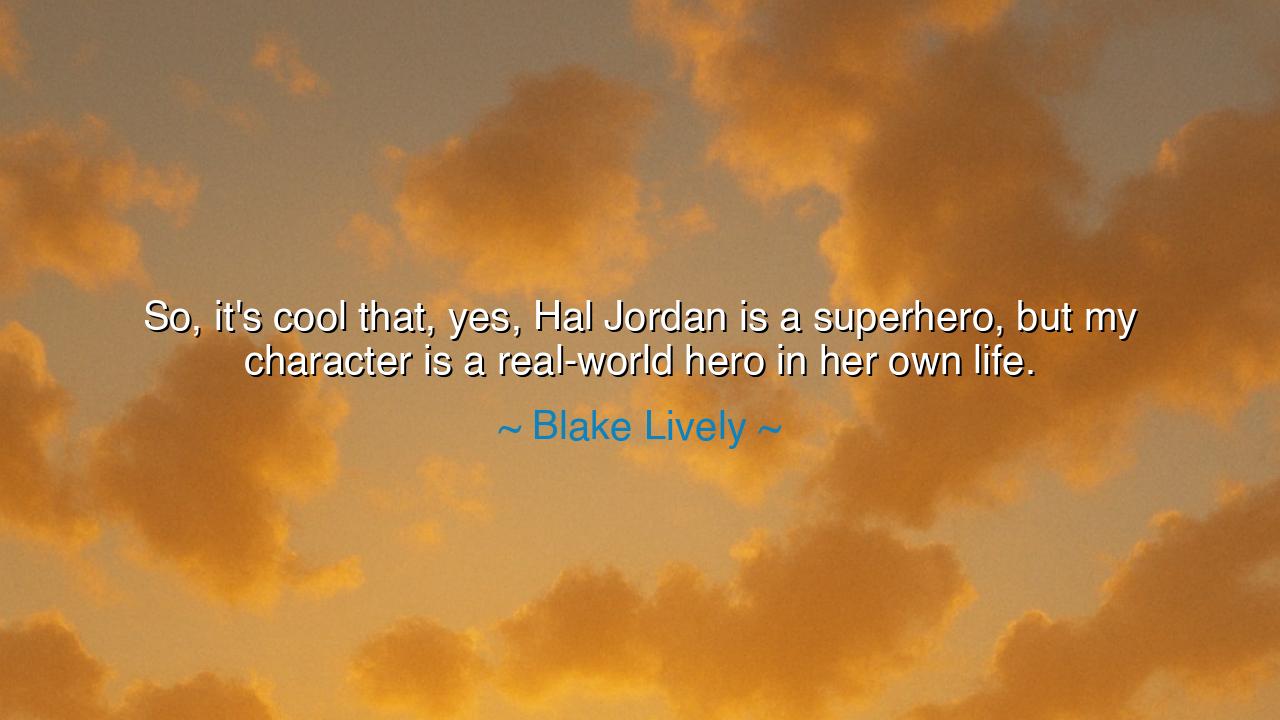
So, it's cool that, yes, Hal Jordan is a superhero, but my
So, it's cool that, yes, Hal Jordan is a superhero, but my character is a real-world hero in her own life.






In the grand tapestry of history, there have always been those who wear the mantle of superhero—figures whose extraordinary feats define them as legendary. Yet, as Blake Lively so wisely puts it, “So, it’s cool that, yes, Hal Jordan is a superhero, but my character is a real-world hero in her own life.” This simple yet profound statement speaks to the essence of true heroism—the kind that is found not in capes or superhuman strength, but in the everyday courage and integrity of individuals living their truth. Lively’s words remind us that the real world is full of heroes who, though they may not possess supernatural abilities, exhibit profound bravery, compassion, and strength in the face of life’s challenges.
In the ancient world, heroism was not confined to the gods or to those who performed impossible feats, but often celebrated the ordinary virtues of courage, wisdom, and justice. Homer’s Iliad offers us the story of Achilles, whose unmatched prowess in battle earned him the title of hero. But it was the quiet sacrifices of other figures, such as Odysseus, who also exemplified heroism—not through raw strength but through wisdom, perseverance, and self-reflection. Odysseus’ return home, after enduring countless trials, was not a physical battle, but an internal one—against doubt, temptation, and weariness. The true hero, as Homer would have us understand, is not always the one who stands on a pedestal of glory, but the one who walks the difficult path with resilience and moral courage.
Similarly, Socrates, in his search for wisdom, embodied a different kind of heroism. Socrates was not a warrior, nor did he conquer empires, but his heroism lay in his unwavering commitment to truth and integrity. He believed that virtue was the highest calling and that the true hero was one who remained committed to justice and the pursuit of wisdom, regardless of the consequences. Socrates’ life and death were not those of a conventional hero, but they left a legacy that shaped the very foundation of Western thought. In this light, heroism is defined not by physical feats, but by the strength of character and the ability to live in accordance with moral truth.
Throughout history, real-world heroes have often been found in the quiet actions of individuals whose contributions are overlooked by the grand stories of war and conquest. Consider the example of Florence Nightingale, who transformed the field of nursing during the Crimean War. Though Nightingale did not fight with a sword or wield magical powers, her heroism lay in her ability to face the horrors of war and serve others with compassion and dedication. Her reforms not only saved countless lives but laid the groundwork for modern healthcare practices. Nightingale, like Lively’s character, was a hero not because of her physical prowess, but because of her selflessness, resilience, and unwavering commitment to others.
In the world we live in today, real-world heroes continue to walk among us. Malala Yousafzai, the young Pakistani activist, is another example of a real hero in the modern age. Malala faced violence, oppression, and near-death to champion the cause of girls’ education. Despite the personal dangers she faced, she stood firm in her belief that education is a fundamental right for all children. Like Lively’s character, Malala’s heroism is found in her courage to speak out, to stand up against injustice, and to remain true to her convictions despite the risks. Her actions remind us that heroism often arises from a deep sense of purpose and moral clarity, rather than from supernatural power.
The message embedded in Lively’s quote invites us to reconsider what it means to be a hero. Heroism is not solely the domain of larger-than-life figures or characters with extraordinary powers. It resides in the actions of ordinary people who rise above adversity, self-interest, and fear to create change, offer care, and challenge injustice. The lesson is clear: each of us has the potential to be a hero in our own lives, regardless of our circumstances or abilities. Real-world heroism is about making a difference in the lives of others, about standing for what is right even when it is difficult, and about confronting our fears and limitations with courage and integrity.
In practical terms, this means that we must recognize and embrace our own capacity for heroism. Whether in our personal relationships, in our communities, or in our professional lives, we each have the ability to make a positive impact. Just as Lively’s character finds her heroism in the real world, we too can make a difference by living with purpose, integrity, and compassion. We must remember that true heroism is not about seeking glory or fame, but about committing to doing good for the sake of others and standing firm in our values, even when the path ahead is uncertain or difficult. In this way, we all have the potential to be heroes, shaping the world through the simple, yet powerful acts of courage, kindness, and dedication.






AAdministratorAdministrator
Welcome, honored guests. Please leave a comment, we will respond soon